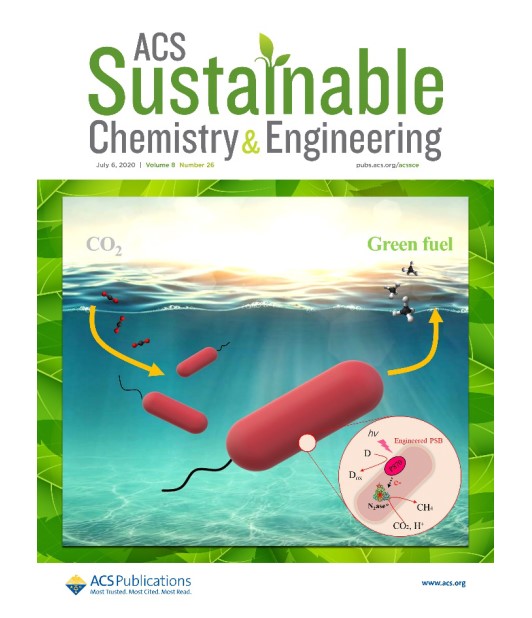Our Institute published a cover article in ACS sustainable chemistry & engineering magazine
The Institute of Biomass Energy of Jiangsu University published the important research work "Photo-driven highly efficient one-step CO2 biomethanation with engineered photo-synthetic bacteria Rhodopseudomonas palustris" in ACS series journals of American Chemical Society. This work was mainly completed by Ma Liqin (Nanjing University of Technology) and Associate Professor Fang Zhen (Jiangsu University) in Biomass Energy Research Institute of Jiangsu University. Professor Yong Yangchun and Professor Zhou Jun of Nanjing University of Technology were co-communicators, and the cover picture was drawn by Associate Professor Fang Zhen.

Carbon dioxide methanation is a promising method for clean energy production and renewable energy storage. However, the current production process of carbon dioxide methane involves the input of non-renewable energy or high temperature and high pressure, which causes people to worry about sustainability. In this work, by endowing photosynthetic bacteria with the ability of carbon dioxide methanation, a sustainable light-driven one-step method of carbon dioxide methanation using whole-cell biocatalysis was established. With facultative anaerobic Rhodopseudomonas palustris as the base strain, Rhodopseudomonas palustris with CO2 methanation was constructed by simple site-directed mutation of endogenous nitrogen reductase and genetic engineering transformation of Rhodopseudomonas palustris. Using this engineering bacterium, a one-step CO2 methanation reaction driven by solar energy was realized at normal temperature and pressure. After optimization, the CH4 yield of light-driven organisms reached the highest level in history (taking the lowest CO2 concentration in seawater as an example, the conversion rate of CO2 to CH4 was 35%), which has high applicability. This study provides an efficient and sustainable methane production method, and demonstrates the great potential of bacterial methanation in converting carbon dioxide and solar energy.
Article link: https://pubs.acs.org/doi/10.1021/acssuschemeng.0c02703